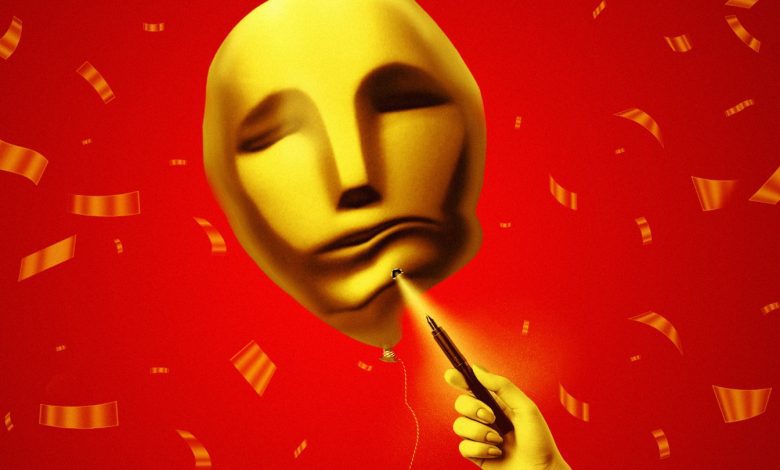Why Oscar Think Pieces Need to Go

This column was conceived not so much as an assignment but as a desperate cry for help to my editors. Please. I’m begging you. Don’t make me write a think piece on One Battle After Another.
Actually, forget the Battle. I’m waging a war.
This time of year — and this year in particular — we are getting film think pieces. Binders and binders full of film think pieces. They tell us whether Paul Thomas Anderson may or may not adhere to a particular sociopolitical agenda. (I swear we had these same conversations about James Gunn and Superman a few months ago.) How Luca Guadagnino’s After the Hunt is a provocative postmodern, post-#MeToo, post-Tár look at victimization culture that’s right on time — or is it way too late? That Kathryn Bigelow’s A House of Dynamite is the nuclear weapons-funding policy document we’ve been waiting for or a cautionary tale about the perils of an elliptical ending. I can’t keep track anymore, and I don’t want to.
We are drowning in think pieces. I’m here to say: Stop with the think pieces. Maybe you feel the same but have been afraid to admit it? That’s OK. We’re in a safe space.
To be clear, I’m not referring to traditional reviews or a smart text-based conversation or reflection. I’m singling out pundits who try to torture a single movie into great meaning, hoping it will make them the next Susan Sontag or Thomas Friedman.
If you admired Guillermo del Toro’s humane spin on Frankenstein — the general Rotten Tomatoes consensus — then this ruminator will make sure you also know that the work shines a light on the horror genre’s increasing tendency to equate disability with depravity. Die My Love, per the think-piecers, is a reason to assess the entire evolution of motherhood.
Sigh.
Friends, here is my fancy public plea: For the love of the Oscar gods — the only gods we all truly agree on — let’s step away from the keyboard and stop twisting every movie into an Auntie Anne’s pretzel. Or, as Peter Falk told precocious Fred Savage in The Princess Bride, “Yes, you’re very smart … shut up.” Sure, I realize the irony of a take arguing against takes. Whatever. I’m too over it to care. I’m on a mission to halt a practice that’s exhausting and unnecessary and at times self-aggrandizing and results in scant cultural consequence.
Most damning of all (imagine Morgan Freeman’s voice narrating this next phrase), the think piece methodically chips away at the joy that comes with seeing a film for the first time. Which most readers of these pieces will not yet have done when they read such disquisitions.
Call it the big picture of the big picture. All that crowing about going to the movies for the communal experience is overrated. What we’re truly doing in the dark is forming our independent opinions about art. The commentary onslaught dilutes that. And the impact of the movie. I exited Springsteen: Deliver Me From Nowhere mulling a whole other aspect of the Boss’ personal life. And then was bombarded with impassioned blather about the upside of nontoxic masculinity.
I get it, during these fraught political times, everything has Major Significance, requiring Major Pronouncements. And it’s so easy to publish a take, whether you write for an outlet or just your social media friends. Only the strong-willed can resist. But resist we must.
Look, this isn’t a lament against intellectualism. I like insightful analysis as much as the next film fanatic. By all means, shoot me your ambiguous-ending theory. But there’s a line between analysis and holier-than-thou bloviation.
And these pieces aren’t a weeklong or monthlong or even autumn-long affair. I’m typing this sentence during the World Series. By the time Conan O’Brien takes the Oscar stage on March 15, we’ll be close to Opening Day. Squeezing every last drop of analysis from a best picture contender during this time span will not magically sway anyone’s position, including an Oscar voter. (Hello, that’s what studio whisper campaigns are for.) Last year, I was mixed on Anora even after it morphed from a skewed Cinderella story to, um, a loving tribute to the sex-work industry. Trust me when I say that the only thing an extended litigation accomplishes is a desire to move the ceremony to January.
So this awards season, let’s allow a movie to just breathe and be, at least for a little while. Let’s watch Bugonia and offer one essay fewer on the disparity of class and power. Cry in Hamnet with just a couple fewer meditations on grief in a post-pandemic society. Watch Battle and think a little less about political parallels and a little more about the hilarious scene in which Leonardo DiCaprio can’t recall a crucial password from his revolutionary days to locate his daughter. I recently saw the movie for a second time, and I still can’t name the password. I just remember laughing, without a need for a 3,000-word treatise.
But if anyone wants to write a long medical story on ways to circumvent middle-aged memory loss, I’m cool with it.
This story appeared in the Nov. 19 issue of The Hollywood Reporter magazine. Click here to subscribe.
HiCelebNews online magazine publishes interesting content every day in the movies section of the entertainment category. Follow us to read the latest news.





